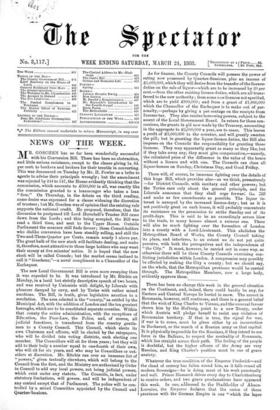The new Local Government Bill is even more sweeping than
it was expected to be. It was introduced by Mr. Ritchie on Monday, in a lucid but strictly descriptive speech of two hours, and was received by Unionists with delight, by Liberals with pleasure damped by envy, and by Tories with rather mixed emotions. The Bill, in truth, gives legislative sanction to a revolution. The area selected is the "county," as settled by the Municipal Act, with the addition of London and the ten greatest boroughs, which are to be constituted separate counties. Within that county the entire administration, with the exceptions of Eduzation, the Poor-Law, the Police, and, of course, all judicial functions, is transferred from the country gentle- men to a County Council. This Council, which elects its own Chairman and officers, will be elected by the ratepayers, who will be divided into voting districts, each electing one member. The Councillors will sit for three years ; but they will add to their body a number equal to one-fourth of their own, who will sit for six years, and who may be Councilors or out- siders at discretion. Mr. Ritchie ran over an immense list of "powers," given textually elsewhere, which will belong to the Council from the first, and the Ministry are authorised by Order in Council to add any local powers, not being judicial powers, which exist under any statute. The Councils, in fact, under statutory limitations, will govern, and will be independent of any control except that of Parliament. The police will be con- trolled by a mixed Committee appointed by the Council and Quarter-Sessions.


































